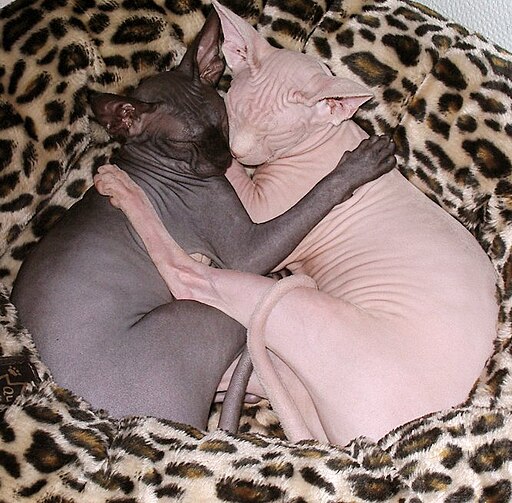Cat Wednesday 2024-01-03
Having cats as pets can be a great source of companionship and comfort. Not only do cats provide unconditional love and affection, but they can also help improve your mental health. Studies have shown that having cats as pets can reduce stress levels, lower blood pressure, and even increase feelings of happiness and well-being. Cats can also help us feel more connected to nature, as they are an important part of the natural world. In addition to providing physical and mental health benefits, cats can also bring joy into our lives with their playful personalities and amusing antics. By providing us with companionship, comfort, entertainment, and relaxation, having cats as pets is an excellent way to enhance our lives and improve our mental health. – Editorial Team
.
Sphynx
.
Editorial Team

PuppetMasteX at English Wikipedia, CC BY-SA 3.0, via Wikimedia Commons
The Sphynx cat is a distinctive and captivating breed known for its hairless appearance, large ears, and friendly disposition. Despite their lack of fur, Sphynx cats are characterized by a warm body temperature and a velvety skin texture. This article provides a detailed exploration of various aspects of the Sphynx cat breed.
**1. Physical Characteristics:
- Coat: The most striking feature of the Sphynx is its lack of a traditional fur coat. Despite appearing hairless, they have a fine layer of down-like fuzz that gives them a soft, warm feel. The skin is often wrinkled, particularly around the head and neck.
- Color Patterns: Sphynx cats come in various colors and patterns, including solid colors, bi-color, and tabby patterns. Their skin can be mottled, and pigmentation may vary.
**2. Body Structure:
- Build: Sphynx cats have a medium to large body with a well-muscled appearance. They are known for their sturdy build and surprisingly heavy weight despite their hairless appearance.
- Head: The head is wedge-shaped with prominent cheekbones. Large ears, lemon-shaped eyes, and a distinct muzzle contribute to their unique facial features.
**3. Personality Traits:
- Affectionate: Sphynx cats are known for their affectionate nature. They enjoy human companionship and are often referred to as “velcro cats” because they love to stick close to their owners.
- Playful: These cats have an energetic and playful demeanor. They enjoy interactive play and may perform acrobatic feats, showcasing their agility.
- Social: Sphynx cats are highly social and get along well with other pets. They are known to be curious and enjoy being the center of attention.
**4. Grooming and Care:
- Bathing: Due to their lack of fur, Sphynx cats require regular bathing to remove excess oils from their skin. This helps maintain the cleanliness of their coat and prevents skin issues.
- Sun Protection: Sphynx cats are susceptible to sunburn due to their lack of fur. It’s essential to protect them from direct sunlight, either by providing shade or using pet-safe sunblock.
- Temperature Control: Despite their hairlessness, Sphynx cats have a higher body temperature than other breeds. They may need additional warmth, especially in colder climates.
**5. Health Considerations:
- Skin Care: Regular attention to the skin is crucial to prevent issues like acne. Owners should check for any signs of irritation or redness.
- Ear Cleaning: Due to their large ears, Sphynx cats may be prone to wax buildup. Regular ear cleaning is necessary to maintain ear health.
- Heart Health: Some Sphynx cats may be predisposed to certain heart conditions. Regular veterinary check-ups are essential to monitor their overall health.
**6. Breeding and Origin:
- Origin: The Sphynx breed originated in the 1960s when hairless cats were discovered in different parts of the world. The modern Sphynx breed was developed through selective breeding programs.
- Genetics: The hairlessness of Sphynx cats is caused by a recessive gene. Breeding requires careful consideration to avoid potential health issues associated with the gene.
The Sphynx cat is a unique and captivating breed that has gained popularity for its distinctive appearance and affectionate personality. While their lack of fur may make them stand out, their warmth, playfulness, and social nature make them cherished companions for those who appreciate their unique qualities and are committed to their specific grooming and health needs.

